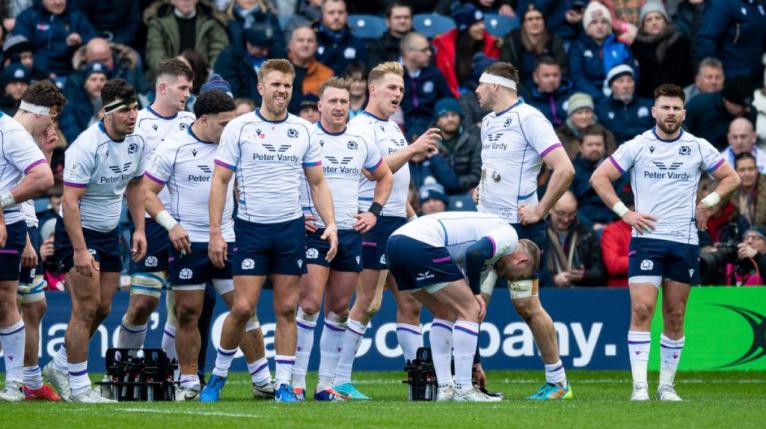If three wins in a championship should not satisfy Scotland’s hunger, two leaves them positively malnourished. That’s the reality they’re facing right now, the stark whipping of the narrative from title contenders in round one to serial bottle merchants come round four.
Barring a catastrophic mishap in Rome, or something extraordinary in Dublin against an Ireland team that has had Scotland’s measure so often they know it down to the millimetre, the only Six Nations rival Gregor Townsend has been unable to smite in his near-five years at the helm, two paltry wins will be Scotland’s lot.
This side – indeed any of the five leading teams in the tournament – exist in a world of microscopically fine margins. The Six Nations, and particularly this Six Nations, is the most ruthless competition in the game. But how can things have unravelled so prolifically for a Scotland squad with such talent, such burnished credentials to finally make their mark on this stage?
They are shipping penalties at an alarming rate, a haul of 38 in three matches giving them the poorest disciplinary record in the championship, far poorer than in either of their previous two campaigns since the World Cup. An average just shy of 13 per Test match is grim.

The much-lauded Steve Tandy defence has shown fissures too, brutally exposed by France. Scotland’s bizarre game plan, their seemingly unrelenting desire to run headlong into Shaun Edwards’ ferocious blitz in dangerous areas of the field, played perfectly in to French hands. France scored six tries at Murrayfield – no side has manage that in the Six Nations for 17 years.
Their go-to men, the players upon whom you can normally hang your hat, are misfiring. Too many were below par in that French hosing. Plenty, not least Finn Russell, have points to prove.
Consistency eludes Scotland like Lord Lucan. They continue to be hounded by an inability to back up big, statement performances – the true mark of a champion team
Perhaps Townsend’s is the biggest point of all. He has the highest win percentage of any Scotland coach, but he also has the finest squad at his disposal of anyone in his position during the professional era. He has shown admirable fortitude and humility to change and adapt, to cede a little control, hire the correct assistants and give them more responsibility. He has taken Scotland to new heights.
And yet, consistency eludes Scotland like Lord Lucan. They continue to be hounded by an inability to back up big, statement performances – the true mark of a champion team. Think of last year and the joyous, decades-in-coming triumph at Twickenham, and the maddening collapse that followed it against Wales a week later. Think of the head-scrambling symmetry of this term, the gusty Calcutta Cup triumph and the meek showing in Cardiff, seven days apart. In fact, you can chart the whole Townsend tenure and follow this infuriating pattern, right back to his very first games as coach, a summer tour in 2017, a fabulous win in Australia and then a beating by Fiji in Suva that sent several protagonists in to the international wilderness.

In 2018, they scalped England in one of the most complete displays of Townsend’s tenure, then lost by 20 in Dublin. In 2019, there was the mayhem of the 38-38 Twickenham draw and the pallor of the World Cup. In late 2020, there was a dogged win in Wales, then a predictably comprehensive loss at the Aviva. Every team has fluctuations in form, but following Scotland is like strapping in to the Nemesis at Alton Towers.
For all the isolated glory, this generation, the greatest clutch of professional rugby players Scotland has ever known, is at risk of coming and going without silverware.
The most galling part of this lament is the ability teeming within this squad, this coaching staff. These men have become the hoodoo-smashers. One by one, they halted heinous statistical runs. They have brought desperate, barren runs to an end over and over. They won in Wales for the first time in 18 years, at Twickenham for the first in 38, and in Paris for the first in 22. They have lost to England once in five matches. They have beaten Australia three times in a row. They came within touching distance of New Zealand in 2017 and South Africa in 2018. They have shifted the dial immensely in how Scotland are perceived, discussed and judged. Such feats were unthinkable a decade ago.
But for all the isolated glory, this generation, the greatest clutch of professional rugby players Scotland has ever known, is at risk of coming and going without silverware.
Hamish Watson will be 31 in October. Stuart McInally and Chris Harris, a late bloomer, will turn 32 this year; Stuart Hogg, Finn Russell and George Turner will hit 30. Other key figureheads – Jamie Ritchie, Ali Price, Zander Fagerson, Jonny Gray, Duhan van der Merwe – are between 25 and 28, hitting their peak years as international competitors.
Nobody is saying any of these guys are finished. Though elite rugby is more physically perilous than ever, pivotal men like Hogg and Russell could make the 2027 World Cup with a little luck and good management.

But there is a gnawing anxiety that Scotland’s clutch of excellence will leave memories, not medals, in their wake. That despite their heroism in reinventing Scottish rugby, they have it within themselves to do more, to go a step further, to seize tangible, indelible success. Not this year, though. And if not this year, then it will have to come soon if it is to happen at all.
Rome awaits on Saturday. Losing seems unthinkable. Defeat would be disastrous. Italy have not won a Six Nations game since a brilliant ransacking of Murrayfield in 2015. The team they have come closest to beating since? Scotland.
Many of sport’s great teams have a ‘nearly’ phase, a time of ifs, buts and maybes, coulda-woulda-shouldas and if-it-wasn’t-fors. Scotland seem to have lived through this agony, but instead of reaching for the next rung, slidden backwards
Then it is on to Dublin. Ireland have bossed this fixture for an age, losing once in 11 meetings. Scotland last beat them on home soil a dozen years ago, in the famous final fixture at Croke Park. Before that, it was 1998 and the old Lansdowne Road. Maybe it is this overwhelming dominance that needles prickly Irish pundits into slapping down the Scots they reckon are getting too big for their boots. There will be plenty riding on that one, particularly if Ireland do the job at Twickenham this weekend. Townsend has never got the better of Joe Schmidt or Andy Farrell, and it is hard to see him and his team suddenly doing so now.
Many of sport’s great teams have a ‘nearly’ phase, a time of ifs, buts and maybes, coulda-woulda-shouldas and if-it-wasn’t-fors. Scotland seem to have lived through this agony, but instead of reaching for the next rung, slidden backwards.
They have the minerals and the talent to be more than this, but you have to wonder if they will ever make it happen.



Comments
Join free and tell us what you really think!
Sign up for free